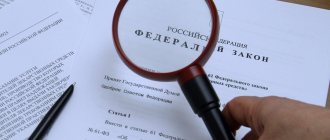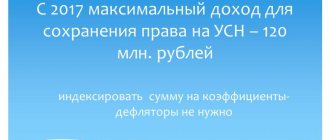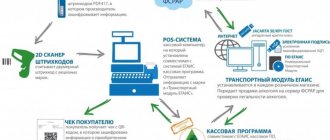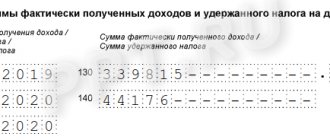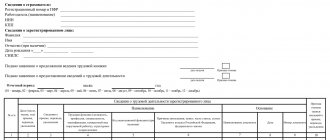The new production calendar for 2020 has come into force
The production calendar for 2020 with holidays and days off, approved by the Government of the Russian Federation, will be an excellent assistant for any business person, manager, accountant, etc.
It already calculates the number of working days and weekends by month and quarter, marks public holidays and indicates the number of working hours for different working weeks.
In total, in 2020, out of 366 calendar days, there will be 248 working days, 118 weekends and holidays.
Accountant's Directory
At the same time, the employer is obliged to warn persons receiving the employee’s personal data that this data can only be used for the purposes for which it was communicated, and require confirmation from these persons that this rule has been complied with. Persons receiving the employee’s personal data are required to observe a regime of secrecy (confidentiality).
We recommend reading: Additional payment for pensioners after 80 years in 2020 in Belarus
For your convenience, we have classified all our publications into categories. This will make it easier for you to find the information you need and will significantly save your time. For example, in the section “Storage and destruction of documents” you can get acquainted with useful information on recording business in an enterprise, and also find out what the procedure is for the correct destruction of documentation. There are also separate sections dedicated to archiving and document management. In the first, you can familiarize yourself with all the features of creating and maintaining a company archive, and in the second, you will learn how to properly organize traditional paper or modern electronic document flow.
The minimum wage has changed since January 1, 2020
Since the beginning of the year, a new minimum wage has come into force - now it is 12,130 rubles.
Note that in 2020 the minimum wage was in effect, which was equal to 11,280 rubles.
Accordingly, from January 1, 2020, salaries, average earnings for vacation pay, travel allowances and other payments, some social benefits will increase in proportion to the increase in the minimum wage.
Regions of the Russian Federation can set their own minimum wage, the only condition is that it must not be lower than the established norm at the federal level.
Compensation payments will presumably be excluded from the minimum wage
This provision has not yet been approved by law, but experts say it will soon be law.
It is assumed that the minimum wage will concern only the actual salary, without taking into account accruals and additional payments to it - for example, for night shifts, after-hours work, etc.
For example, an employee’s salary is 10 thousand rubles. For working night shifts, he was paid an additional 3 thousand rubles a month. In total, the worker’s income is above the minimum wage, and the employer is not obliged to increase his salary to the norm.
According to the new bill, for comparison with the minimum wage, only the actual salary of the worker - 10 thousand rubles - is subject to consideration. As we can see, this is below the established norm, and the employer is obliged to increase his wages to at least 12,130 rubles.
The Ministry of Labor proposed a new procedure for changing labor relations during an epidemic
Now, adjusting labor legislation, as the Ministry of Labor points out in the note, is a long process that requires the participation of executive and legislative authorities, parties to social partnership (trade unions and employers).
We are talking, for example, about the need to introduce a temporary order of rotational work in continuous production, the Ministry of Labor explained to RBC. “In order to avoid mass infection at continuous-cycle mining enterprises, at geological exploration and at a number of other facilities in strategically important industries, it is necessary to introduce an observation regime (a period of medical observation. - RBC) for employees arriving on shift. Currently, there is no regulatory framework that would allow an employee to be paid for such an observation,” the ministry explained. Given the epidemic, there is a threat to the continuity of production, and to prevent this, it is necessary to increase the duration of the shift by three months in agreement with the employee.
“The necessary special conditions for regulating labor relations are primarily dictated by the strategic interests of the employee. It is extremely important today to preserve jobs and create conditions for companies to continue their activities as much as possible,” the Ministry of Labor emphasizes. The adoption of such temporary regulations will take place in agreement with social partners - trade unions and employers, the ministry clarified.
Putin instructed the Ministry of Labor to monitor compliance with the rights of workers remotely Society
The Ministry of Labor's bill was submitted for consideration to the Russian Tripartite Commission (RTC) for the regulation of social and labor relations. The RTK is a government coordinating body in which representatives of trade unions and employers participate.
RBC sent a request to the government press service. The press service of the Institute of Legislation and Comparative Law under the government did not provide a comment at the time of publication.
Special procedures during an epidemic
This is not the first time that the Ministry of Labor is developing bills on a special procedure for regulating labor relations during the fight against coronavirus. In March, the ministry proposed giving the government the right to determine the notice period for an employee about an upcoming dismissal due to staff reduction or in connection with the liquidation of an organization during an epidemic. The specific deadlines for which the employee must be notified were not defined in the bill, but according to one of the versions of the draft (RBC reviewed it), in the event of an epidemic, the ministry proposed establishing a two-week warning period for the employee about the upcoming dismissal instead of two months. The government did not support the bill due to potential risks for workers and suggested that the Ministry of Labor not submit it for approval, sources told RBC.
Russian business associations advocated a simplified procedure for layoffs during the crisis. At the beginning of April, the four largest Russian business associations (RSPP, Delovaya Rossiya, Opora Rossii and Chamber of Commerce and Industry) sent a joint appeal to Prime Minister Mikhail Mishustin, in which they asked for the period of the acute phase of the crisis to reduce the period of notice to workers about the upcoming dismissal and the period payment of average wages to employees if they are not employed. At the same time, the business proposed to freeze or reduce the employer’s financial liability for violations of labor laws during dismissal or non-payment of wages. None of these initiatives were included in the government’s anti-crisis program to support business.
Trade unions are against
The Federation of Independent Trade Unions of Russia opposed the Ministry of Labor's bill on the government's temporary right to regulate labor relations, emphasizing that the Labor Code already contains features of the legal regulation of labor relations during emergency situations. The regulation of labor relations in accordance with the Constitution and federal constitutional laws is carried out primarily by the Labor Code. Federal laws, presidential decrees, government regulations and all by-laws must comply with it. Amendments to the Labor Code and suspension of its provisions should be carried out by separate federal laws.
Ministry of Defense center for coronavirus patients in Odintsovo. Photo report Photo gallery
Strict regulation of labor legislation is due to its special role for the socio-economic interests of citizens, emphasizes Deputy Chairman of the FNPR Alexander Shershukov. “We know very well this mechanism for granting temporary emergency powers. Then they will say: “This mechanism has proven itself well,” and they will secure it on a permanent basis. There is no need, citing an emergency situation, to try to significantly change long-established practices,” he said in a commentary to the trade union publication Solidarity.
The bill prepared by the government actually abolishes the current legislative norms regulating the social and labor sphere, says a joint appeal by the Confederation of Labor of Russia and the Federation of Trade Unions of Maritime Transport Workers. “The problems arising in labor relations today are primarily related to the massive violation of workers’ rights, and not to the presence of gaps in the regulation of labor relations,” say trade union representatives.
The Ministry of Labor proposed to establish disability remotely due to COVID-19 Society
Under the guise of emergency measures and “revolutionary expediency,” officials are trying to gain as much power as possible, without thinking that their actions are a gross violation of the foundations of the constitutional system of the Russian Federation, which provides for the principle of separation of powers, the head of the department of labor law and social security law of the Moscow State Law Academy told RBC them. O.E.Kutafina Nikita Lyutov. The implementation of the bill will allow the government to be able to regulate by secondary legislation what should be regulated by labor legislation, he believes.
Almost no Russian company will avoid staff reductions due to the economic consequences of the fight against coronavirus, a survey by the Central Social Research Center among 1.4 thousand enterprises from April 10 to April 17 showed. More than a third of companies (38%) sent employees on unpaid leave. The coronavirus pandemic, quarantine restrictions and the devaluation of the ruble due to the collapse in oil prices have led to a decrease in demand in the economy; due to declining profits, companies are forced to optimize their staff and cut salaries.
Chairman of the Accounts Chamber Alexei Kudrin, in an interview with RBC, warned of a threefold increase in unemployment - from 2.5 million to 8 million people by the end of the year. Real incomes of Russians may fall by 17.5% in the second quarter, and at the end of the year the reduction will be 6.5%, the VEB.RF Research Institute predicted. In the ACRA rating agency's base scenario, unemployment will rise to 6.7% and return to pre-crisis levels only in 2022, while real incomes will fall by 6.4%.
The government has increased the maximum amount of unemployment benefits to the level of the minimum wage (12.13 thousand rubles) and intends to pay unemployed parents an additional 3 thousand rubles. for a child up to three years old. However, experts believe that this is not enough: it is necessary to simplify as much as possible the registration of the unemployed and the payment of the benefit itself, as well as increase its size by at least 25%, calling it, for example, a “temporary subsidy due to loss of income due to forced self-isolation,” the Center suggests labor research HSE.
Subscribe to the RBC newsletter. We talk about the main events and explain what they mean.
Electronic work books have been introduced - a digital alternative to paper work books.
We have already talked about the features and procedure for obtaining electronic work books from 2020. Employers are required to notify each employee personally before opening documents digitally. Notification is sent in writing.
For six months, an employee may wonder whether he needs an electronic work record book or whether he will need a paper one. He must make a decision by December 31, 2020; he informs the employer about his decision in a written statement of refusal or consent to maintain an electronic work record book.
For those employees who are just starting their careers in 2021, work books will only be created electronically.
Bills
Above are all the changes to the Labor Code since 2020. Recent news, however, suggests that we should expect new amendments. The Ministry of Labor has developed a bill that involves introducing quite significant changes to labor legislation. For example, amendments will be made to Part 9 of Art. 11 of the Labor Code of the Russian Federation. It is assumed that the rules of the Labor Code of the Russian Federation will not apply to self-employed citizens. Also, individuals offering housekeeping and personal care services will be exempt from the code.
Most of the bill concerns employers - individual entrepreneurs. They will be allocated to a special group of employers, and they will also be required to keep work books. The individual entrepreneur has the right to make changes to the employment contract only if the previous conditions cannot be maintained, after notifying the employee two weeks in advance. A bill on the introduction of electronic work books is scheduled to be introduced in February. The Government is considering bills that provide for employer liability for violating the rules for transferring wages to an employee’s card.
Thus, it is proposed to significantly change not only the rules for registering an employee, but also to generally remove some working citizens from the scope of labor legislation due to the impossibility of regulating their working relationships (as stated in the Explanatory Note).
⇐Subscribe to our channel in Yandex.Zen
!⇒
The SNILS document will also change
No, the old paper SNILS documents that were issued previously do not cease to be valid - they are still important and relevant. But young people are currently receiving a new notification from the Pension Fund of the Russian Federation instead of this document.
The information in the document has not been changed - just like in the paper SNILS, it will contain the employee’s full name, document number, date of birth, gender, place of birth.
Let us remind you that from April 1, 2020, the Pension Fund no longer issues paper SNILS.
Future retiree - be prepared!
For those who are already pensioners, as well as those who are planning to go on vacation in the near future or in the distant future, the Government of the Russian Federation has prepared two news - one bad, the other good.
- The first innovation that awaits currently working Russians is an increase in the period or period of retirement. As stipulated in the corresponding draft law, which has already passed the approval process in the State Duma of the Russian Federation, the minimum age threshold at which men retire is 65 years, for women this period will be 60 years. Naturally, this can make few people happy, since they will have to work for several more years before they can receive a state-guaranteed pension.
But besides this, there is such a fact as the difference in the amount that future pensioners will pay additionally (withheld in the form of pension contributions from their salaries) - this is more than 2 million rubles. and those pension payments that he can receive after finishing his working career. And this is only about 600 thousand rubles. (taking into account the so-called “survival period”). Those. a difference of almost 1.5 million rubles, a working person is highly likely to “donate” to the state budget.
- A more positive innovation that awaits all those who already receive a pension is an increase or indexation of pension benefits to the level of annual inflation predicted by the Government. This increase will consist of two periods.
First, from February 1, 2020, indexation will be carried out by an average of 3%.
The second stage of the increase is scheduled for April 1, 2020. The size has not yet been precisely determined, and indexation will be carried out based on the capabilities of the consolidated budget of the Pension Fund of the Russian Federation (Pension Fund).
However, it should be noted here that such indexation will not affect all pensioners, but only those who do not work, either privately or under an employment contract. For this category of pensioners, special indexation is provided, which is carried out in early August of each year.
- In 2020, the Government decided to cancel points as an assessment of the accumulation of pension funds and return to the previous procedure for determining the amount accumulated in the personal account of each future pensioner in real money. This amount must be at least 40% of his previous average earnings.
This is undoubtedly a positive fact, since it allows you to operate and control a pensioner’s account not in virtual points, but in real monetary terms.
Employees will soon be able to submit applications electronically
To simplify the submission and acceptance of applications, bill No. 736455-7 is under consideration to submit these documents electronically.
If the bill is approved, then new articles 15.1 – 15.3 will be added to the Labor Code.
Currently, such applications are also accepted, but only from remote employees. The rest must submit applications in writing, since until now, to confirm and identify the citizen’s identity (and that this application came from him) a personal signature is required on the document.
Employees will be able to submit electronic applications in the following cases:
- Recruitment.
- Dismissal.
- Vacation.
- Accountability.
Etc.
Freelancers and self-employed citizens will have to pay
If until now the government paid little attention to those who were usually called self-employed citizens or those who work in the “garage economy” - tutors, nannies, nurses, trainers, etc., now the issue has finally been resolved not in favor of the people “free” professions (and there are approximately 23 million of them in Russia). Since 2019, according to the amendment made to Ch. 22 of the Labor Code of the Russian Federation, now self-employed people must create and register with an SRO (self-regulatory organization - something like a trade union).
In addition, such employees will have to:
- Obtain the appropriate TIN (even if they do not issue individual entrepreneur status).
- Also, create a work book or indicate in the existing one that he works part-time outside his main place of work (I wonder how this will look in practice?).
- Any self-employed citizen will be required to enter into written contracts or agreements for the provision of services with his clients, partners.
- Fill out annual tax returns in the form of personal income tax-3 and pay taxes on your own income. True, it is not entirely clear who and how will take into account their expenses, according to what standards, and how depreciation of means of production will be taken into account and written off - for example, a tutor’s piano, an artist’s brush or a writer’s ballpoint pen.
- Also, the self-employed will have to independently pay fees to the Pension Fund of the Russian Federation, the Compulsory Medical Insurance Fund (MHIF) and the FSS (social insurance fund).
Fortunately, in all this legislative impulse of the State Duma of the Russian Federation, no administrative, much less criminal, punishment has yet been provided for evading such “legalization” of one’s creative and other activities, for which someone pays fees or simple remuneration.
In addition to the above serious and urgent changes in the labor legislation of the Russian Federation, which should be prepared for from the first day of the new year 2020, you should also take into account the new schedule (working calendar) of weekends and holidays, which is also traditionally and constantly determined by the Government of the Russian Federation. Such a graph is presented in the corresponding figure.
The timing of vacation pay will also be changed in 2020.
The bill has not yet been adopted, but it will happen soon.
According to it, the employer is obliged to pay employees vacation pay no later than three working days before the start of the vacation.
In this regard, part 9 of Article 136 of the Labor Code of the Russian Federation will change.
What does it mean? For example, an employee goes on vacation from Monday next week. We count back three working days - and this is Friday, Thursday and Wednesday - and we get the result: vacation pay must be paid to the employee no later than Tuesday in the previous week before the vacation.
Previously, the employer was obliged to pay vacation pay no later than three calendar days. That is, if an employee goes on vacation on the following Monday, vacation pay was paid no later than Thursday of the previous week.
For unscheduled vacations, deadlines for payment of vacation benefits will also be established.
Currently, there are no strict rules for paying money before an employee’s unscheduled leave - funds are paid according to general rules, that is, no later than three calendar days before the person goes on vacation. But there is a contradiction in this that can turn against the employer, although not through his fault - if the employee wrote a vacation application within three calendar days before his vacation, the employer does not have time to pay him vacation pay within the time limits established by the Labor Code.
Now, an employee who wrote a vacation application later than three working days before the vacation will receive money within three working days after he wrote the application.
For example, an employee wants to go on unscheduled leave on Monday, and wrote an application on Friday. The money must be paid to him no later than Tuesday (within three working days from the date of filing the application - Friday, Monday, Tuesday).
Parental benefits have changed significantly
If a child was born after January 1, 2020, the parent has the right to receive benefits for him for up to 3 years.
But not all families will receive payments, but only those in which the income per family member is no more than twice the subsistence level of the working-age population, established in the region in the 2nd quarter of the previous year. That is, in 2020, the 2nd quarter of 2020 is considered to calculate benefits.
Social security pays benefits for the first child, and the Pension Fund for the second. The parent receiving the benefit will need to annually confirm their income and bring a certificate when the child turns one or two years old.
Clinical examination
From January 2020, Federal Law No. 353-FZ of October 3, 2018 comes into force, supplementing the Labor Code of the Russian Federation with Article 185.1, which establishes guarantees for employees to undergo medical examination.
All employees have the right to be released from work while maintaining their place of work (position) and average earnings to undergo a medical examination - once every three years.
Employees who have 5 years left before the new retirement age and working pensioners have the right to be released from work while maintaining their place of work (position) and average earnings to undergo medical examination - for two working days once a year.
But there is a nuance. It makes no difference when the employee wants to undergo medical examination. According to the amendments, days of release from work must be agreed upon with the employer, most importantly, within the established period (one year, three years) and subject to an application from the employee.
By the way, the procedure for undergoing medical examination of the adult population is established by Order of the Ministry of Health of the Russian Federation dated October 26, 2017 No. 869n.
Fines for employers for military registration will increase
If employers, for one reason or another, do not report employees who have not registered with the military, they will have to pay a fine of 5,000 rubles.
Previously, managers had to pay fines from 300 to 1000 rubles.
We remind you that clauses on military registration are recommended to be included in the employment contract.
Organizations that employ young people of pre-conscription age are required to report on employees who are:
- 15 or 16 years old – until October 1.
- 17 years old – until November 1.
When the bill on increasing fines for draft evaders No. 620700-7 comes into force, the manager will pay a fine of 3,000 thousand for failure to submit such lists.
Legislative changes
The list of information about employees that cannot be disclosed has been added
Document: Government Decree No. 1197 dated September 13, 2019 “On amendments to the composition of information posted in the unified personal data information system that ensures processing, including collection and storage, of biometric personal data, their verification and transmission of information on the degree of their compliance with the provided biometric personal data data of a citizen of the Russian Federation, including the type of biometric personal data"
From September 24, 2020, HR officers will have to take written consent from employees in order to transfer their personal e-mail or mobile number to colleagues.
Consent is not required if you submit a report to government agencies that requires the employee’s email or telephone number. Officials included this information in a unified information system that ensures the processing of biometric personal data.
New fines for overworking drivers and lack of tachographs in vehicles
Strict rules regarding drivers who are required to take rest breaks on long journeys will be reinforced by increased fines for employers and the organization itself in case of non-compliance with these rules when organizing the work of drivers:
- The director pays 7-10 thousand rubles.
- The company pays 20-50 thousand rubles.
Previously, fines were imposed only on drivers who did not comply with the rules, while enterprises received warnings for violating labor laws.
Currently, fines are also imposed for using vehicles without a tachograph:
- The director will pay 7-10 thousand rubles.
- The company will pay 20-50 thousand rubles.
Quotas for foreign workers approved
The total quota in 2020 for foreign persons with visas hired to work in Russia is 104,993 people. This is slightly less than in 2019 (144,583).
For vegetable growing organizations, restrictions now apply in all regions of Russia, and not only in the Primorsky Territory and Astrakhan Region, as was previously the case.
Construction companies can hire visa-based foreigners without taking into account the permissible share in Moscow, the Amur Region and the Republic of Buryatia. In the Republic of Dagestan, the permissible share of foreign workers is 50% of all employees, and not 80%, as before.
Changes in the Labor Code of the Russian Federation for those who are still working
A fairly significant range of changes in 2020 is provided for in labor legislation, affecting almost all workers. The most interesting ones include the following:
- increase in the minimum wage by just over 1% (1.05%). The total amount of the minimum wage will average about 11,280 rubles. However, each region of the country has its own values for this indicator, established by agreement between regional governments and the Ministry of Labor of the Russian Federation.
- An increase in the basic minimum wage indicator will naturally entail an increase in various benefits and payments provided under the Labor Code of the Russian Federation for workers of various categories and status (for sick leave, maternity leave, etc.). So, for example, a child care allowance upon reaching the age of 1.5 years will be 40% of the minimum wage or in monetary equivalent - 4512 rubles.
- introduction of electronic work books into circulation. For now, pilot programs will be used in selected regions in 2020. The full introduction of e-books throughout the country is planned for 2020. Moreover, until 2027, both traditional work books in paper format and electronic ones will be used in parallel within the framework of the transition period.
- it is envisaged to introduce amendments to labor law norms regarding the issue of granting leave to mothers with many children (large families). Thus, according to the new provision of the law, an employee who has three or more children under the age of 12 has a preferential right to choose the time of vacation at any time of the year convenient for him. This, on the one hand, allows the employee to use vacation time optimally for his family, and on the other hand, the employer is relieved of the need to resolve the issue of approving such vacations each time. Now he can plan in advance the vacation time of such employees or employees with many children.
New notices about foreign workers
If the organization employs foreign workers, in 2020 the employer must use new samples of notifications about them:
- In case of concluding a contract - labor or civil.
- In case of termination of the above agreements.
- When the company fulfills its obligations to pay wages to a foreigner - a highly qualified specialist.
- When hiring and dismissing a foreigner receiving education in Russia.
- When providing unpaid leave for more than one month to a foreigner studying in the Russian Federation.
The new notification samples differ from the old ones in that the sections have more space for specifying data. If the form is still not enough, you are allowed to use additional sheets, which should be numbered and certified with a signature on the last page.
What employers need to prepare for in 2020
In addition to pensioners and workers, some changes in labor legislation will not bypass employers.
First of all, the following innovations should be noted:
- The amount of compensation for workers in the event of delayed wages due to the fault of a company or organization has been increased by 50%. Now the amount of such compensation is at least 10 times the key refinancing rate of the Central Bank of the Russian Federation from the average amount of the employee’s salary for each overdue day of payment.
- The rights of labor inspectorates have been expanded, which can now directly on behalf of the employee (upon his personal written application) apply independently to the courts to protect or restore the employee’s violated rights by his employer.
- Inspection checks will also be carried out through the Labor Inspectorate, and the number of controlled parameters will be increased from 107 checklists to 120.

